Have you ever found yourself scrolling through Instagram, googling the latest travel news, or watching TV and been shocked to hear about some of the common travel scams that people get sucked into in South East Asia (and beyond)?
It’s always at the forefront of our minds when we travel.
‘Is this a scam?’
‘Is this legit?’
And then we protect our bags and belongings and run around in fear for our lives, too worried that we’ll be one of the next people to succumb to a dreaded travel scam and end up on the news for our family and friends to laugh at.
I can’t tell you the number of crazy things I’ve come across in my years of travelling. So far, Europe and South East Asia have been the worst in terms of the number of scams that tourists and travellers are faced with. While I have so far been lucky that nothing has happened to me, I am usually well prepared or learn from a tour guide or local what not to fall for.
So, today I am here to talk you through the top 9 travel scams in South East Asia that you might see when travelling there so that you are prepared. Some are harmless while others are far more sinister. The good thing is, they can all be avoided by knowing what to look out for and what to do when they happen.
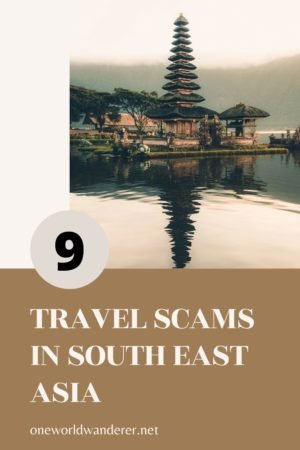
Disclosure: This blog post contains affiliate links, which if you click, adds absolutely no extra cost to you. These links allow One World Wanderer to continue providing you with free guides and travel content.
Table of Contents
1. The Happy Ending Travel Scam
We’ve all heard of this one. The happy ending at the end of a delightful massage…
This one usually plays out as follows- you, most likely a solo male traveller (sorry men) are approached by a massage parlour employee offering an amazing price on a massage. You agree and follow them to the parlour to receive your message. Whether or not you’re offered a ‘happy ending’ (we all know what this is), doesn’t matter.
You’re immediately flanked by thugs who walk your horny ass to the nearest ATM and force you to withdraw money, which they steal.
If this isn’t the end result to your now not so happy ending, often the women will request a tonne more money than what you originally agreed on for the massage. If you refuse to pay up… well… let’s just say there are usually security guards there for a reason.
How can you avoid the happy ending travel scam in South-East Asia?
I recommend firstly, never get massaged by a woman who offers you something from the street. Research and find a more reputable and well-known massage parlour.
Also, um, I hate to say it but don’t agree to get jerked off by a stranger on the street.
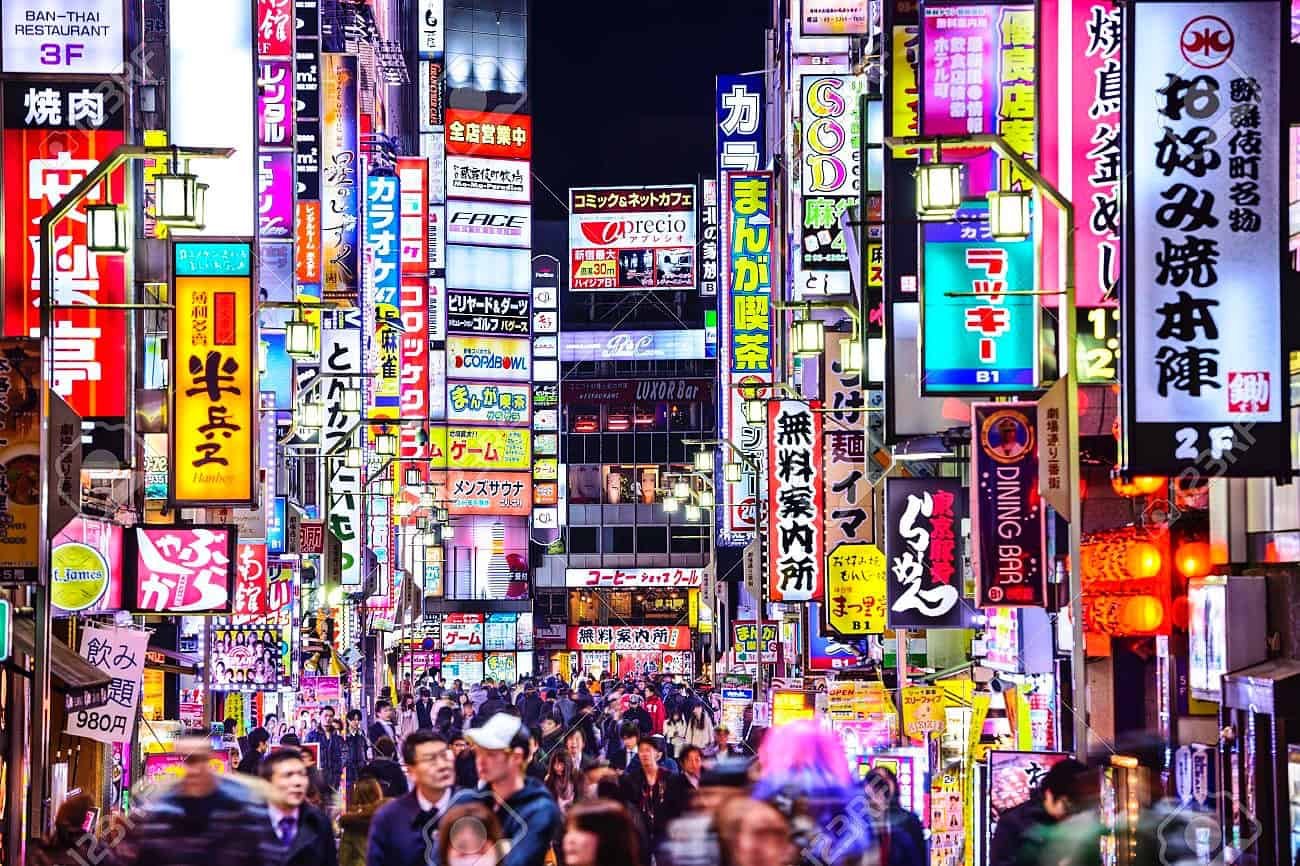
2. The Dodgy Tuk Tuk Tour
Ahh.. this old scam. This happened to friends of mine in Cambodia, and while it wasn’t a tuk-tuk in Ho Chi Minh, we had the same thing happen to us in Vietnam from a cab!
You meet a Tuk Tuk driver (or cab driver) who offers to show you around the city at a reasonable rate. They want to be a tour guide for the day and sound like they really know their stuff. You say yes, agree on a price, and get geared up for a lovely day of adventure.
It starts off well but very quickly, you’re dragged into a store that sells knock-offs, hand made jewellery or some other item that you really don’t need or want.
Whether this happens or not, there are many other scams tuk-tuk drivers like to play. Some agree on a price only to up it immensely when you arrive at your destination. Others like to drive you to locations, and when another option pops up it will leave you stranded. I’ve also heard of many other tuk-tuk drivers that scheme with their friends to drive you past you on a scooter and steam your items (see common travel scam number 6).
How can you avoid the dodgy tuk-tuk?
Don’t accept the first offer that a tuk-tuk driver throws your way. Also, I would be wary of ever accepting a tour from a tuk-tuk driver- just simply use them to get from a to b.
I always recommend trusting your gut in situations like this. If it seems a little dodgy or feels uncomfortable, I always recommend to just walk away. You’re better off trying half a dozen tuk-tuks to find the right one than rush into the first person you meet.
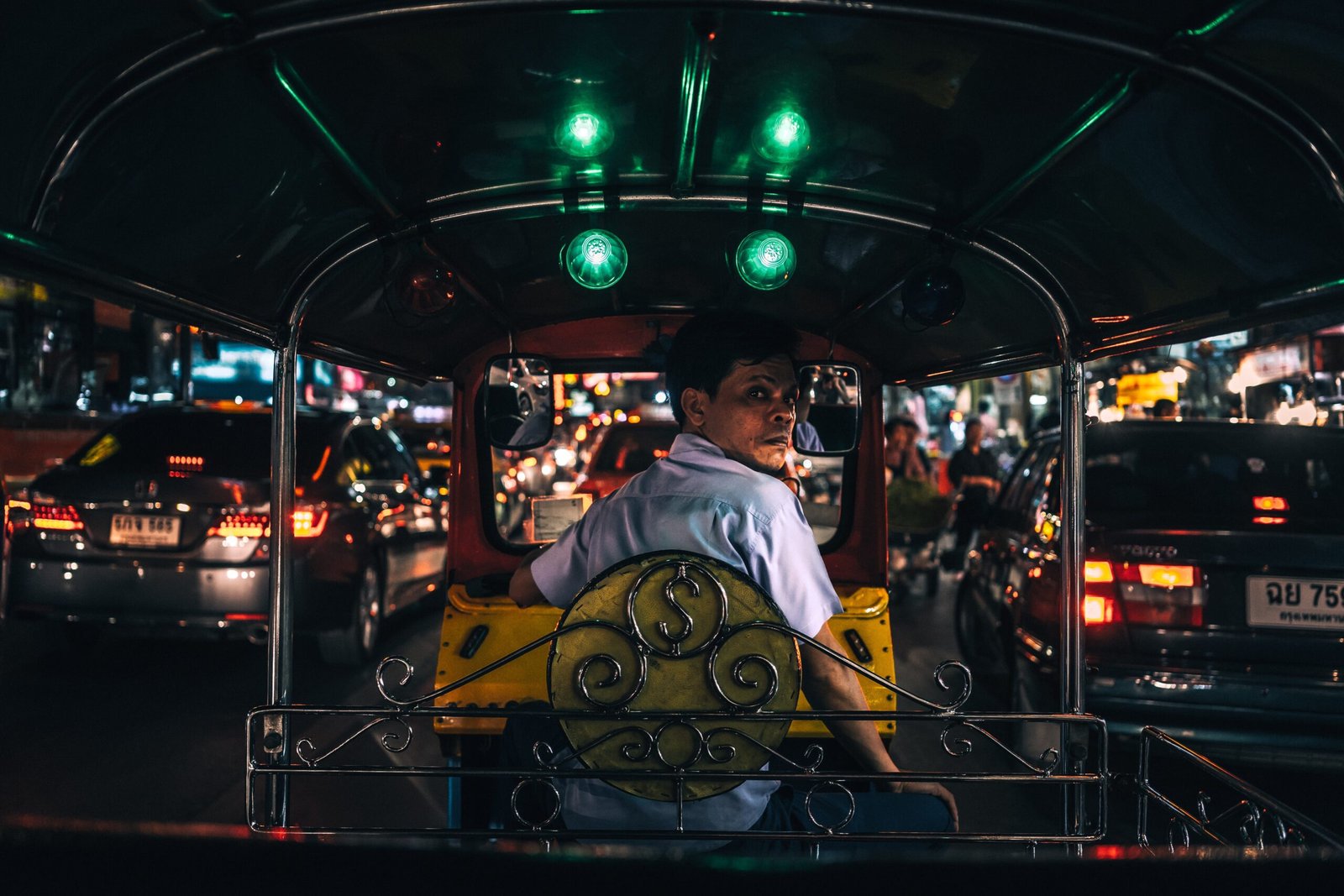
3. The Hungry Baby Travel Scam
This scam is popular in Cambodia, especially Siem Reap and Phnom Penh. I came into contact with it several times, and it is both confronting, sad, and really easy to get fooled by.
This travel scam goes a little something like this. You’ll be approached on the street by a young girl (she usually looks like she’s in her teens or maybe even younger) clutching a baby. Instead of asking you for money, the girl will cleverly ask you to buy her baby formula. It’s sad. You want to help because you’re in a foreign land that is often a lot less well off than you.
Bu the thing is- the scam is that after you buy the formula from the store she guides you too, she then returns it and she and the store owner split the profits. Or, while she’s distracting you with asking for help, her friend is actually stealing from your bag.
This goes on all night, and it sucks because they are usually pretty successful.
One of the saddest things about this scenario is that often the baby is drugged to sleep so that it does not cry or disturb the scamming process. It’s quite obvious actually- they are usually unnaturally limp and too sleepy for a newborn.
How can you avoid the hungry baby travel scam?
Just say no, even though it might be a little difficult. You aren’t helping the girl or the baby in any way by buying the formula, you’re just adding to an industry that encourages women to skip out on education and beg on the streets. From this early start to life, they often never receive an education, fall into the hands of local gangs, and wind up pregnant well before they reach adulthood. This starts a cycle that continues and gets passed from generation to generation.
I just want to note here that this one is something I learned all about from my local Cambodian guide in Cambodia and he was so passionate about it, he teared up. He regularly works to try and stop the cycle of no education in young Cambodian children and says one of the main ways to help is to not buy into the scams so that children are forced to do something more productive with their time.

4. The Friendly Local Travel Scam
Sounds kind of nice, right?
In truth, it’s one of the most common travel scams in all of South East Asia. It happened to a close friend of mine in Thailand and has been attempted on me many times as well.
It looks a little bit like this. You’re out and about taking on the city, exploring, eating, adventuring, and drinking. The next thing you know, you’re approached by one or more friendly locals. He seems harmless so you indulge it. And sometimes, maybe he is just a friendly local. this is where it can be different depending on your location. He asks you to take a photo with him or something. He invites you to do something with them. It could be to enjoy a traditional tea ceremony, join him for dinner come to check out the local bar that he will give you free entry and drinks in.
Whatever the activity, at the end of it, you’re hit with a huge bill that you are forced to pay.
How can you avoid the ‘friendly local’ travel scam?
Just say no. It’s sad, because you may be missing out on a genuine offer from a local one day, or you may really want to spend time getting to know the locals, but the reality is most times it will be a scam that fools many tourists.
Don’t reason with them, don’t engage, just say no and walk away. These people are professionals, they will say and do whatever it takes to lure you in. Be aware! Don’t cave!
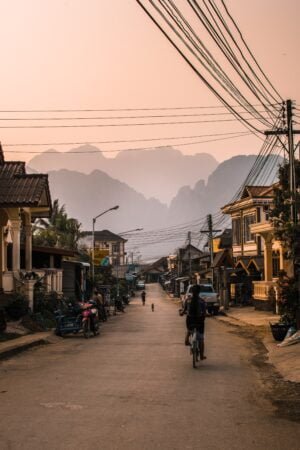

 5. The Malfunctioning Taxi Metre
5. The Malfunctioning Taxi Metre
Another classic travel scam to be wary of when travelling South East Asia is the malfunctioning Taxi metre.
This one is pretty simple, and it goes something like this. You jump into a taxi and head towards your destination. You’re playing on your phone, looking out the window… and then bam! You look up to find the price on the metre is going up very quickly! Or similarly, you are travelling along and when you stop at your destination, the price doubles!
In some cases, your view of the taxi metre may be obscured out of view from the back so you don’t notice it happening until it’s too late.
Similarly, and I have had this happen to me in Vietnam, the taxi driver will take your money at the end, hide it really quickly, and then demand that he never received any money and continue to pester you until he gets another cut.
It sucks, and in my experience, they will pester you and chance you down the street until they receive the money they demand.
How to avoid malfunctioning Taxi Metre?
The best way to avoid this travel scam in South East Asia (and anywhere if it happens to you) is to agree on the fare price before you get into the cab. Although you still run the risk of the driver scamming you at the end or changing his mind entirely, I have found that this is the best way to secure a more legitimate driver.
It also pays to ask your hotel or research how much a fare from point a to point b should cost you. That way you have an approximate cost of the journey and don’t get scammed.
Once again, like the tuk-tuks, if something feels off, don’t get in! Just find another cab driver or walk if it’s possible.
6. The Scooter Pirate Travel Scam
This almost happened to me in Phnom Penh and if it were not for my local tour guide sitting beside me, my handbag and phone would have most likely been stolen from my grip!
While it’s technically not a scam, you do need to be aware of it in the bigger cities of Vietnam and Cambodia because it happens a lot.
Picture yourself walking along the streets of whatever city you are dreaming of travelling to in South East Asia with not a care in the world. Or, you’re sitting on a tuk-tuk heading to dinner or lunch or somewhere exciting, with nothing but a backpack sitting beside you and your camera hanging off your shoulder.
Now, picture yourself in the street crying because a scooter pirate whizzed past and grabbed both right off ya shoulder or from the seat next to you and disappeared into the winding streets before you could even turn around to look at them. They can get away with it every single day because you’re moving slow and they’re moving really fast.
It sucks, but it actually happens a lot!
I’ve also heard of cases where these scammers actually carry scissors and are ready to cut through straps to get their hands on your items.
How to avoid the scooter pirate travel scam in South East Asia?
You have to secure your stuff!
My tour guide in Cambodia was really concerned about us girls driving around, particularly in the bigger cities. He made us strap our backpacks to our body, with the bag to the front and the straps done up around the middle.
He was also cautious to make sure our wallets and phones were in the bag so that nothing could be snatched from our hands while we drove.
I also really recommend travel insurance! Make sure you’re covered for all your gear before you go so that you can claim any theft or losses while travelling abroad.
If you’re reading this blog then you’re more likely to be seeking epic adventures for an affordable price over relaxing and luxurious vacations. By far, my favourite, most comprehensive adventure travel insurance is World Nomads. They also cover for electronics, which could be a great addition if you’re planning on taking things like cameras!
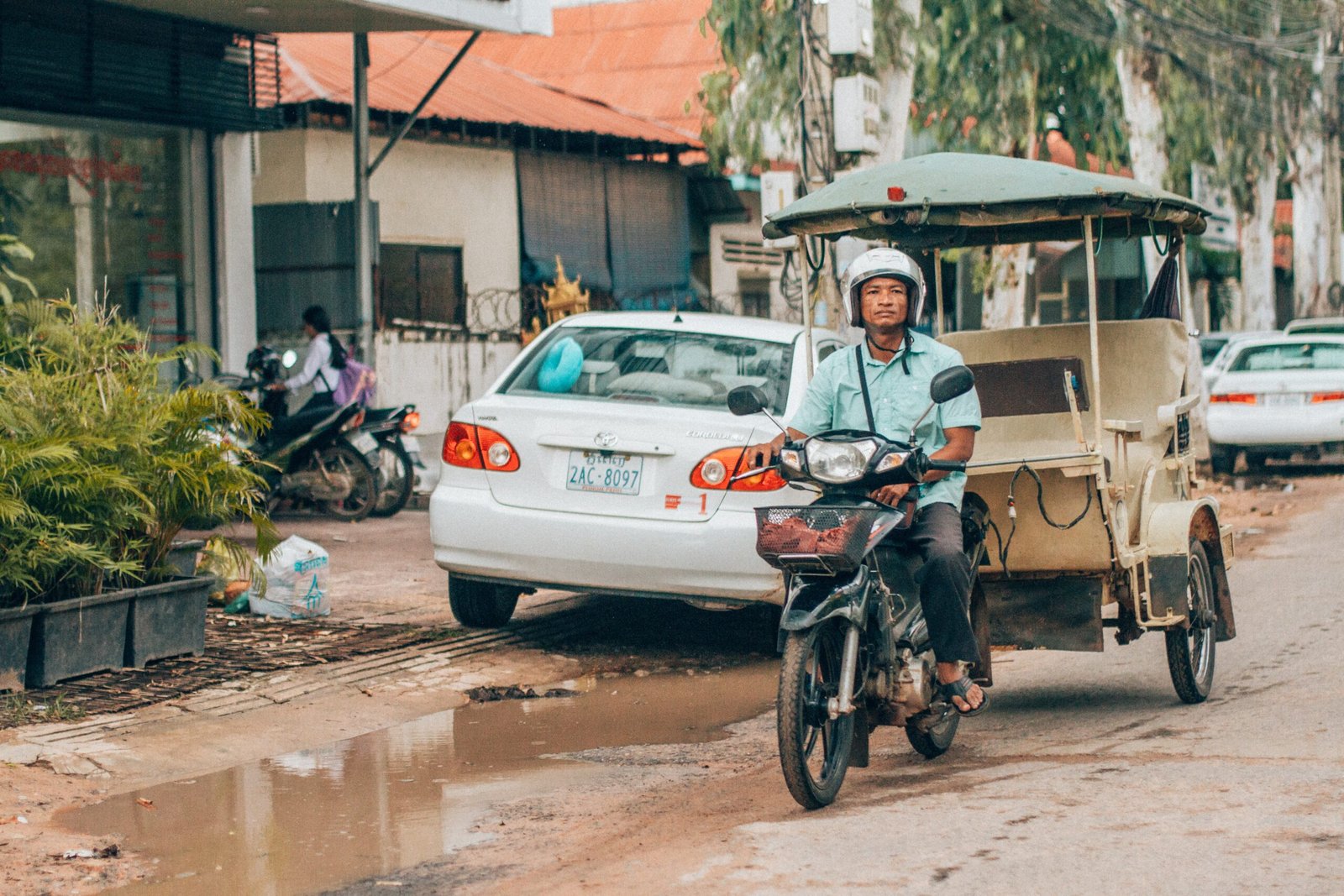
7. The Ping Pong Show Price Switch
Bangkok is notorious for Ping Pong shows. Don’t know what it is, maybe google it… or just use your imagination.
Essentially, ping pong shows are a seedy form of entertainment that is one of the most common travel scams tourists fall for.
This common travel scam involves the old price switch-a-roo. You’re told the cost of the show prior to entering and offered a free drink along with it. Then, at the end of the show, you’re slapped with a huge bill of around $500 or more! If you refuse to pay you can be threatened by bouncers or even worse, robbed! As with many of these scams, until you agree to pay you are pestered and followed and it is really shitty.
I’m not saying all are like this. I am ashamed to say the ping pong show I saw in Cambodia was actually a really legitimate show with no scamming involved, however, I still wouldn’t recommend going. It was actually really boring, kind of gross, and always makes me think of the situation these people must be in to be working in this industry (particularly the women).
How to avoid the ping pong scam in South East Asia:
Don’t support this industry in any way, shape or form. The human trafficking and sex trades in South East Asia are big, and attending these shows just supports them. Even if the women (and me) are there by their own free will, it’s not a healthy and sustainable lifestyle and should be shut down.
Also, speaking from experience, it’s actually really boring and totally crappy to watch. After 20 minutes my travel group was ready to leave.
8. The Short Change Travel Scam
This one is really common, and unfortunately, it is another one of those crappy travel scams that actually happens a lot when travelling around South East Asia.
When you find yourself moving around a lot, dealing with different currencies and probably running on a lack of sleep (because travel is exhausting guys), it gets overwhelming. It’s very easy to mistake 10,000 for 100,000 and hand over the wrong note entirely.
Crafty scammers are more than willing to take advantage of this! We got seriously scammed in Vietnam by one of the dodgy taxi drivers who did exactly this. He claimed we hadn’t paid him enough and so we each had to fork over an extra few thousand Dong! This is also something that happens a lot to people when dealing with currency transactions. Never ever take your eyes off your money, and always research or ask your hotel front desk the best ones to go to.
How to avoid the short change travel scam?
Take some time to familiarise yourself with the local currency before spending anything. Look at the notes, study them and work out what each is equivalent to in your native currency.
When paying, take your time to slowly and carefully count it out and double-check each note’s value.
Also, and this is the golden rule of travel, never turn your back or take your eyes off your money when handing it over. This is when cashiers or taxi drivers or whoever else it is you are dealing with often hides the cash you handed over before demanding more.
9. The Look At These Cute Kids!
Children in South-East Asia are irresistibly adorable! I’m not even a kid person and I loved the little kids I came across.
Sadly, there are bad people out there who have realised this and exploit young kids. Like the girl with the baby in number one, travel scams involving kids are very popular in many South East Asia countries because the high tourist numbers allow them (usually only the adults) to earn a decent enough amount of money.
It can look a little bit like this- the children distract you while you’re pickpocketed from behind, they sell items to tourists outside of frequently visited spots like Angkor Wat, or they pretend to be raising money for fake orphanages or something similar.
The worst part? These kids often never receive any education, earn little to no cutting of the money, still have to scrape around for food, and in the worst cases, get taken into a lot worse exploitation industries by gangs and other groups.
How to avoid the cute kid travel scam (despite how cute they are)?
It can be sad to refuse a small child because they often look so innocent and cute. However, for the large part, these kids know what they are doing and they know how to milk it from tourists.
Don’t donate willingly to people on the street. I always recommend to strike up a conversation with them first. Don’t encourage the cycle of purchasing anything from children or by giving them money or food. It just encourages them to skip school and hustle instead.
If you want to do good, donate your money to official charities that actually help them get education, food and basic necessities.
There you are, the top Travel Scams you’ll come across in South East Asia
The world is full of people looking to take advantage of you, but it’s important to note that not everyone is like that. So don’t let these travel scams turn you off ever travelling through South-East Asia. Not everyone or every situation listed above will result in you being scammed, but it’s important to know everything before you travel so you can be wary if a situation presents itself.
I have absolutely adored my travels to South East Asia, and have gone back over and over again. The people in all of these places are beautiful, friendly and welcoming, many of whom depend on tourists to support their families.
Rather than being afraid, just educated yourself! Read as many blog posts about travel scams as possible, learn what to expect, and know how to avoid them!
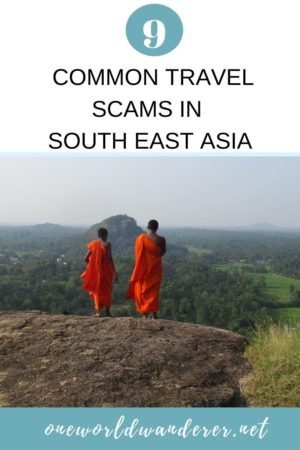
Book Your Trip To South East Asia
Book Cheap Flights
Still in the planning stage of your trip? Currently, the best and easiest way to find cheap flights is to use eDreams, Bravofly and Skyscanner. Between them all, you’ll be guaranteed to always find the cheapest flight, anywhere in the world.
Book Your Accommodation
Whether you’re looking for hostels, hotels, guest houses, or resorts Booking.com will always give you the best deals. Sometimes, if I want to stay in a place a little longer, I’ll use Airbnb. You can sign up with Airbnb and get $51 AUD off your first trip!
TIP: For the best hostels, I usually compare reviews on Hostelworld then check other booking sites to compare prices and deals. Not sure on hostels? Read this post to find out everything you need to know about them!
Book Tours and Transport
Although a combination of independent travel and touring is my ideal form of travel, if the best, cheapest, and safest way to explore is to book a tour or package, I’ll do it! For this, I always use Viator and Get Your Guide.
Related South East Asia travel posts:
The Killing Fields and S21: A Chilling Cambodian Experience
Surprising Facts You Didn’t Know About The Angkor Complex!
The Ultimate Angkor Wat Travel Guide
Should You Visit Bali’s Tanah Lot?
Have you or someone you know ever been scammed while travelling? Was it one of the ones on this list? Let us know your story in the comments!




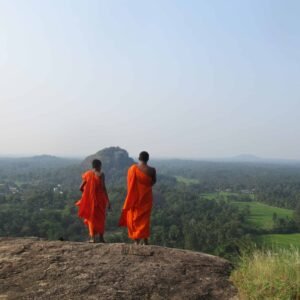
Leave a Reply